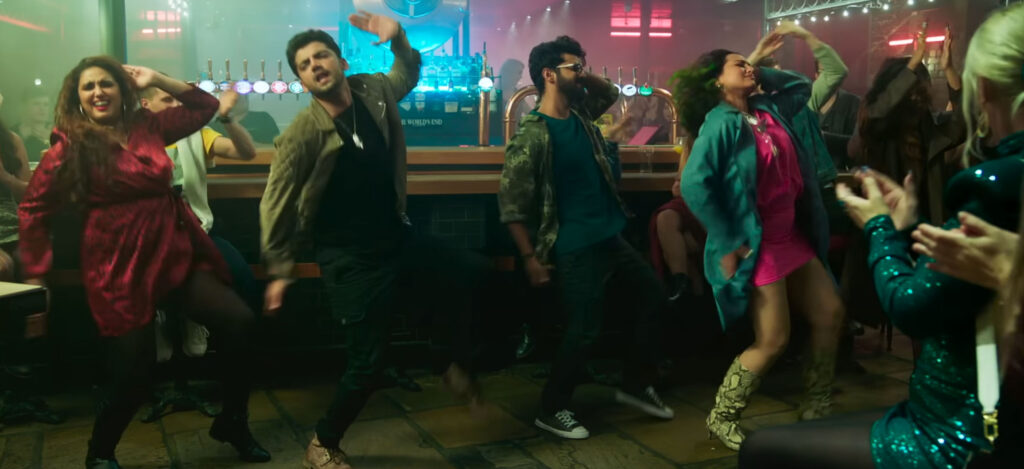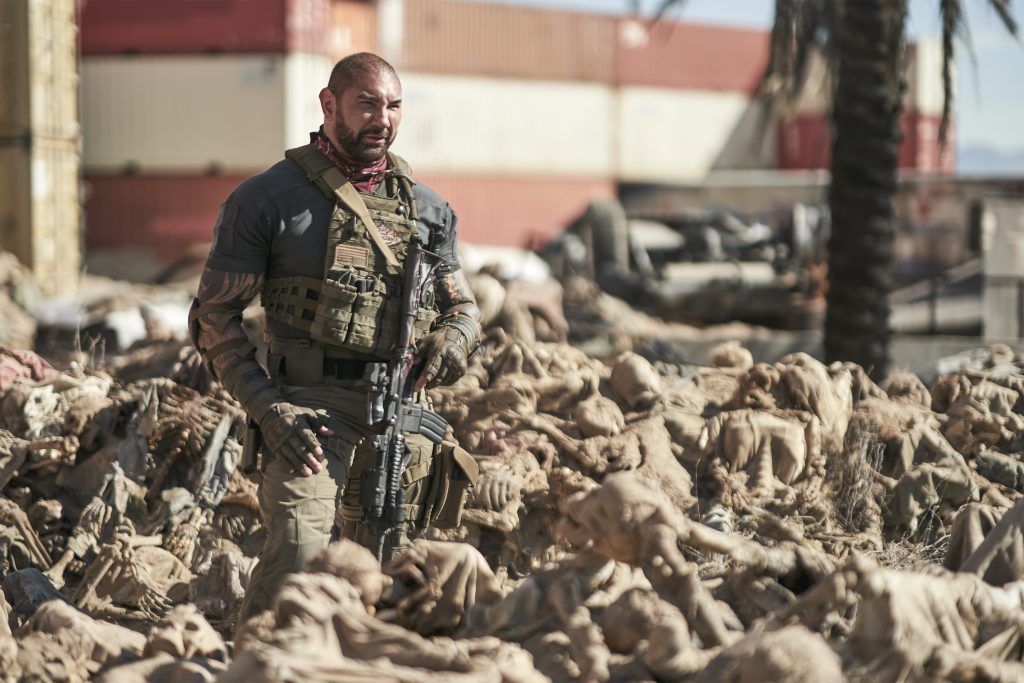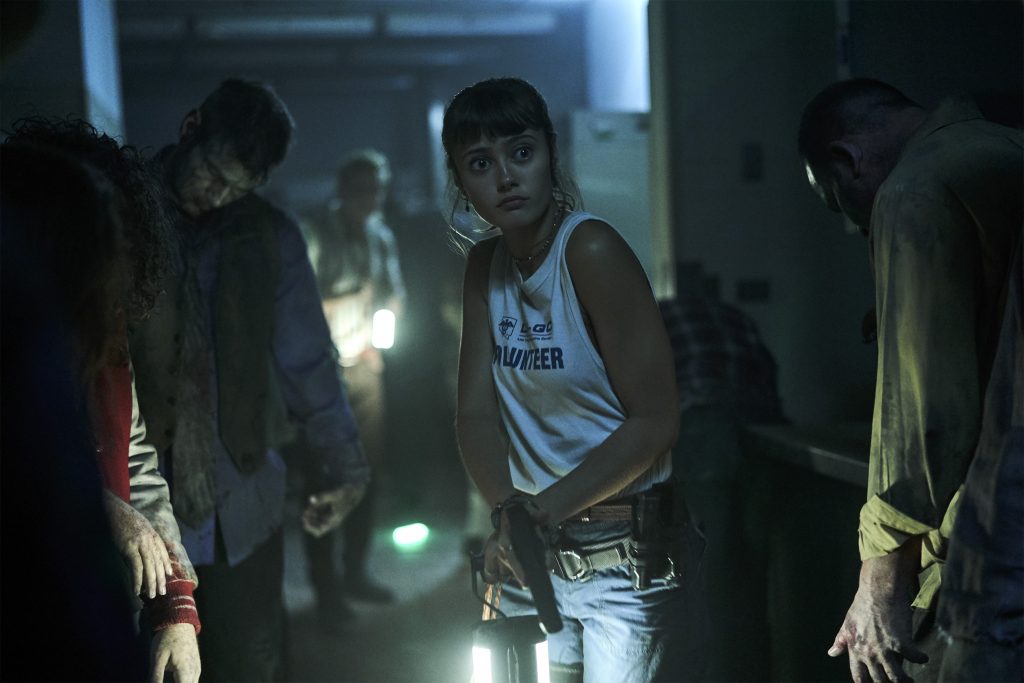November 10, 2022
by Carla Hay

Directed by Satram Ramani
Hindi with subtitles
Culture Representation: Taking place in India and in London, the comedy/drama film “Double XL” features a predominantly Indian cast (with some white people) representing the working-class, middle-class and wealthy.
Culture Clash: Two plus-sized women in their 30s—one who’s an aspiring sportscaster, the other who’s an aspiring fashion designer—become fast friends in London, where they are pursuing their dreams but experience discrimination because of their body sizes.
Culture Audience: “Double XL” will appeal primarily to people interested in movies centered on plus-sized women and issues about weight discrimination, but the movie mishandles those issues with far-fetched situations and sappy solutions.

“Double XL” wants to preach about body positivity and female empowerment, but this inept dramedy is overloaded with witless clichés and irksome performances. Weight prejudices and low self-esteem are used as silly gimmicks in many unrealistic scenarios. Instead of making women look independent and capable of handling their own career decisions, “Double XL” sends a very contradictory and socially backwards message that women need love interests who can help women with their careers.
Directed by Satram Ramani, “Double XL” had the potential to be a good movie, based on the overall concept: Two plus-sized women meet by chance, quickly become friends, and encourage each other to pursue their career dreams, despite being discriminated against because of their weight. “Double XL” is pretending to be that type of female-empowerment movie. But it’s really a messy junkpile of bad rom-com platitudes pushing the misgyonistic belief that men have to set examples for women on how to be confident and make the right decisions.
“Double XL” (with an uninspired screenplay written by Mudassar Aziz and Sasha Singh) is just another lazy and outdated movie that follows an over-used formula of women acting like whiny ditzes until they have male love interests who come to their rescue and help make their dreams come true. The women scream, cry or pout when things don’t go their way. Their male companions are the voices of reason who give pep talks to the women to help boost the women’s self-esteem and give them advice about their careers.
It should absolutely be applauded when people are emotionally supportive of each other and help each other with their careers. But when a movie defines it along gender lines, as one gender being “smarter” (intellectually and emotionally) than another gender, that’s when it’s sexist and problematic. People who have the misfortune of watching “Double XL” will see that the women in the movie are always seeking advice and help from men, but men don’t seek advice or help from women. And that’s why “Double XL” is a fake feminist film.
“Double XL” begins with the biggest stereotype of stereotypical romantic comedies: A woman having a fantasy about meeing a handsome Prince Charming. In this opening scene, Rajshri Trivedi (played by Huma Qureshi) is in her bed, dreaming about being at a fancy gala, where cricket star Shikhar Dhawan (playing a version of himself) sees her and asks her to dance. Her dream is interrupted by the shrieking of her demanding mother (played by Alka Kaushal), who is in the room and ordering Rajshri to wake up.
Rajshri, who is in her mid-30s, lives with her parents and paternal grandmother (played by Shobha Khote) in the rural town of Meerut, India. Rajshri’s father (played by Kanwaljeet Singh) is passive and quiet—the complete opposite of his wife. Rajshri’s mother is the worst stereotype of an angry and pushy mother who demands that her daughter should be a wife and mother by a certain age. And if the daughter can’t meet this demand, she will be considered a failure.
Rajshri knows that she’s not ready to get married at this point in her life, but her mother won’t listen to her and insists on matchmaking for Rajshri. Needless to say, Rajshri has not found a good match with any of the suitors who are introduced to her. The movie shows her having an awkward “date” with a guy named Tito, who is visiting the Trivedi home in a matchmaking setup from Rajshri’s mother.
When Rajshri asks Tito what his dreams and goals are, he says he wants to open a ball bearing shop. Rajshri tells Tito that she wants to be a TV sportscaster (cricket is her favorite sport), and she shows him some test sportscasting videos that she wrote and directed herself. Tito then tactfully tells Rajshri that he’s not attracted to her body size. And then, he bluntly tells her that if she wants to be a TV sportscaster, “you’ll have to lose weight for that too, because the rest of the world is an idiot like me.”
Meanwhile, in New Delhi, another plus-sized woman in her 30s is in a clothing store, where she’s trying on a blouse that’s size XL. She’s an aspiring fashion designer named Saira Khanna (played by Sonakshi Sinha), who is very outspoken about her opinions. Sara wears a lip ring and has green streaks in her hair, so she doesn’t look like a traditional fashion designer. Her tacky choice of clothes that she wears is also questionable for someone who wants to be taken seriously as a fashion designer, but that’s a whole other issue.
The blouse that she’s trying on is too small for her arm area, which causes the blouse to rip. Saira is infuriated because she thinks any blouse labeled size XL should automatically fit her. She marches over to the store’s sales clerk, tells him why the blouse ripped, and she yells at the sales clerk for mislabeling the blouse as XL. Saira also refuses to pay for the ripped blouse because she says that it’s the store’s fault that the blouse didn’t fit her.
It’s misplaced anger, because more than likely it was the blouse’s manufacturer, not the store, that mislabeled the blouse. As an aspiring fashion designer, Saira should know that, but this movie makes the leading female characters look very ignorant about the industries where they want to have professional careers. Saira lectures the store clerk about how she’s a fashion designer, and she would never label a blouse as XL if it’s too small for her to wear. The store clerk sheepishly says he’s sorry and admits that maybe the blouse size was mislabeled.
After going on that ill-tempered rant, Saira gets some good news at home: A company is interested in investing in her work so that she can possibly start her own fashion label. She has to go to London for this job opportunity, and she accepts this offer with no hesitation.
Saira is next seen at a house party while she’s still in India. Her boyfriend Viren (played by Danish Pandor) is also at the party, and she can’t wait to find him to tell him the good news. While he’s in another area of the house, Saira overhears a younger woman named Nomi (played by Isha Dhillon) cattily tells some female friends that Viren is just using Saira for money and sex, and that Saira can’t get a better man because of Saira’s physical appearance. Saira looks hurt by these remarks, but she doesn’t let Nomi know she overheard this insult.
Saira has a best friend named Meera (played by Dolly Singh), who doesn’t approve of Viren and thinks Saira should break up with him. At the party, Saira finds Viren and tells him the good news about the job opportunity in London. He is very happy for her and congratulates her. But Saira looks like she’s secretly bothered about what she heard Nomi say about her.
Meanwhile, in Meerut, Rajshri can no longer take the pressure from her mother to find a husband. During a heated argument, Rajshri finally tells her meddling mother that she wants to have a career as a TV sportscaster, and she’s going to pursue this career in London. Her mother thinks it’s a foolish dream.
But they both make a compromise and a bet with each other: If Rajshri can accomplish her goal of becoming a professional sportscaster within a year, then her mother will stop pressuring Rajshri to get married. If Rajshri can’t accomplish this goal within a year, then Rajshri has to move back to India and let her mother find a husband for Rajshri.
Saira and Rajshri both end up in London, but they don’t meet each other immediately. Saira has an older brother (played by Sachin Shroff) who lives in London, so she stays with him while she’s there. Rajshri is staying with her married aunt named Rolie Mausi (played by Swati Tarar), who welcomes Rajshri with open arms.
As soon as viewers find out that Saira has a best friend who doesn’t like or trust Saira’s boyfriend, it should come as no surprise what happens next. Saira has to end her trip to London sooner than she expected. When she’s back in India, she goes over to Viren’s home for an unannounced visit. He looks very surprised to see her and is reluctant to let her inside.
Saira insists on going inside and is suspicious about why Viren is nervous. He tells her nothing is wrong, but she goes from room to room, to find out if Viren is hiding anything from her. And sure enough: A woman is hiding outside on the bedroom balcony, wearing nothing but a blanket. This no-longer-secret lover is Nomi, the woman from the party who was insulting Saira.
Saira predictably has a screeching meltdown, while Viren tries to appease her. His lies and pleas don’t work. Saira, who thought she was going to spend the rest of her life with Viren, breaks up with him. And then she says out loud that she should’ve listened to what her best friend Meera said about Viren.
Saira goes back to London, where she is rejected to be the director of a fashion travelogue because of her physical appearance. Around the same time, Rajshri goes on an open audition to be a sportscaster, but she’s also rejected because of her body size. It also doesn’t help that Rajshri doesn’t dress like a professional sportscaster during a job interview but dresses more like she’s a frumpy schoolteacher or a nanny.
After these rejections, Saira and Rajshri end up sobbing in the same public restroom. They tell each other why they’re crying and find out that they’ve both experienced discrimination because of their body sizes. And just like that, Saira and Rajshri decide that they’re going to become friends who will help each other fulfill their career dreams.
Saira’s brother works at a TV station, so that’s how Saira meets mild-mannered Srikanth Sreevardhan (played by Mahat Raghavendra), a camera operator who is Tamil and barely fluent in Hindi. Saira has decided to do a video fashion shoot of her fashion designs, so Srikanth has been recommended to her as the camera operator. Srikanth has a co-worker friend named Zorawar Rahmani (played by Zaheer Iqbal), nicknamed Zo, a line producer who is a hyper and talkative partier. Srikanth and Zorawar are both bachelors who don’t have girlfriends.
Even though “Double XL” is ostensibly about Saira and Rajshri helping each other, all the big breaks they get are only because of actions taken by their new male companions. Rajshri unrealistically gets to interview real-life, retired cricket star Kapil Dev (playing himself in the movie) because Zorawar set up the interview. “Double XL” makes a point of mentioning that it was Zorawar’s idea for Rajshri to do the interview, and he took the initiative to arrange for the interview to happen, so that he could give Rajshri a pleasant surprise.
But this accomplishment is tainted, because in order to get the interview, Zorawar lied and said that Rajshri operates an orphanage for 150 children. Kapil thinks he’s doing an interview for a charity. This interview (which is not on TV but recorded for Rajshri’s intended demo reel) becomes the source of some ridiculous hijinks that complicate Rajshri’s sportscaster dreams.
Meanwhile, the storyline about Saira’s fashion career becomes a time-wasting drag where her biggest “challenge” is filming models on the streets of London without a permit. She only chooses slender models for her first fashion shoots. And then, Saira has an “a-ha moment” that you know is coming as soon as the movie had that scene with Saira getting angry about trying on a size XL blouse that was too small for her.
“Double XL” is very lopsided in presenting the storylines of Saira and Rajshri, because Rajshri’s storyline takes up the bulk of the anxiety-ridden “drama” in the movie. Saira has a lot more self-confidence than Rajshri has. Saira’s career struggles aren’t as bleak, because she has a talent to create things on her own and just has to find enough people to buy her designs. Fashion designers (unless they are also models) are not judged as harshly for their physical appearance as people whose job is to be in front of a camera.
By contrast, Rajshri’s TV career goal is entirely dependent on being a hired by a mainstream media company that will judge her on how she looks, including her body size. And there’s also the matter of Rajshri being from a rural area and getting used to living in a big city. Saira has been a resident of a big city for a long time, so her adjustment to being in London is a lot easier than Rajshri’s adjustment. The movie has plenty of moments where Rajshri is depicted as a naïve “country bumpkin.”
With “Double XL” focusing almost all of the career problems and self-confidence issues on Rajshri, Saira’s storyline looks less significant in comparison. The biggest thing that Saira does for Rajshri in her career is predictably give her a fashion makeover. But what does Rajshri really do for Saira’s career? Not much, except tag along at her fashion shoots because Saira asked her.
Because’s Saira’s storyline become so uninteresting and limp—literally limp, because Saira sprains her ankle during a photo shoot—”Double XL tries to spice it up by making Saira annoyed with Zorawar and his irresponsible ways. And when a formulaic movie like “Double XL” has two unmarried people of the opposite sex who get irritated with each other but have to spend a lot of time together, you know where everything is going with this contrived relationship.
Rajshri is so caught up in trying to get a job as a TV sportscaster, she doesn’t notice that Srikanth has quietly become attracted to her. He opens up to Rajshri that his dream is to become a feature-film director. Srikanth says that his father encouraged this dream but didn’t live long enough to see Srikanth fulfill this goal. Srikanth eventually makes a huge move to show his affection and admiration for Rajshri.
One of the major problems with “Double XL” is that the characters are more like caricatures. Viewers with enough life experience and common sense will have a hard time connecting to the four main “Double XL” characters, who all are very immature for their ages. They act more like people in their early-to-mid-20s rather than in their 30s. Rajshri’s storyline is much worse than Saira’s because of all the “only in a movie” fakeness in her plot developments.
Rajshri is also hopelessly ignorant about how the sportscasting industry really works. “Double XL” tries to make this ignorance look like Rajshri is just a sweet, innocent ingenue. But in reality, her ignorance makes her look unprofessional and undeserving of all the lucky breaks that she expects to rapidly come her way, just because she’s in London.
Rajshri gives up too easily, but Srikanth is there to tell her all the right things and improve her confidence. Rajshri knows that her body size could be an obstacle to getting certain jobs, but the movie makes Rajshri use her body size as a self-defeating crutch/excuse for every single failure that she has in life. After a while, this self-pity becomes pathetic. Rather than portraying Rajshri as enterprising and clever, “Double XL” makes her into a “damsel in distress” who needs a man to rescue her—in other words, the opposite of female empowerment.
The movie’s dialogue is very trite and mostly not very funny at all. The acting isn’t much better, although Sinha (as Saira) fares the best out of all the principal cast members when it comes to comedic timing and delivering her lines in a way that tries to look natural. All of the other characters in the movie are either too bland or too obnoxious.
“Double XL” has predictable scenes of Saira and Rajshri complaining to each other about how society can body shame women, especially women who are plus-sized. And what do Saira and Rajshri do to further wallow in their misery? They go to a fast-food place and order as much junk food as they can on the menu.
It’s supposed to be an act of defiance, but what are they trying to prove? No one else in the movie cares that Saira and Rajshri want to binge on junk food. This gluttony scene is the type of “comedy” that “Double XL” is desperately trying to convince viewers is funny, but it’s really a thinly veiled mockery of plus-sized women. “Double XL” gets worse as it goes along until it eventually becomes a thinly veiled mockery of real female empowerment.
T-Series Films released “Double XL” in select U.S. cinemas and in India on November 4, 2022.


